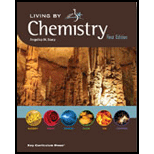
Interpretation:
Three ways by which people have managed to obtain pure metals for use in making tools and other objects are to be described.
Concept introduction:
Pure metals are very important in our lives. They are used for making objects like tools, cars, wires, jewelry, bridges etc. Through the ages, humans have made great progress in extracting pure metals for various uses.
Answer to Problem 1E
Some processes used to extract pure metals include:
- Mining - Some metals like silver and gold have to be dug out directly from the Earth.
- Heating - Most metals occur in nature in combined state with other atoms. Metal compounds can be heated to give pure metals. When iron (III) oxide is heated to very high temperatures in the presence of charcoal, the oxygen in the compound is removed as carbon dioxide and solid iron is left behind.
- Electroplating- Electricity can also be used to extract pure metals from their ionic compounds. Copper can be extracted from a solution of copper sulfate by passing electricity through the solution. Copper ions move towards negatively charged nickel strip and deposits as pure metal on the strip. This process is called electroplating.
Explanation of Solution
Given information:
Pure metals can be extracted by various methods for use in making tools and other objects.
There are three main processes of extraction of metals.
- Mining - Some metals occur in pure state in nature as they are not very reactive metals. Such metals can be directly obtained by simply digging and finding them. This kind of activity is called mining. Gold and silver are extracted by this method.
- Heating - Most of the metals found on Earth occurs in combined state. So they have to be extracted from their compounds. The metal compounds can be heated to very high temperatures to yield metals. For example wheniron (III) oxide is heated to very high temperatures in the presence of charcoal, the oxygen in the compound gets removed as carbon dioxide and solid iron is left behind. With the help of construction of better blast furnaces many metals were extracted by this method.
- Electroplating - Electricity can also be used to extract metals from their compounds. For example copper can be extracted from a solution of copper sulfate by passing electricity through the solution. A simple circuit is set up with a battery connected to two nickel strips placed in a beaker of copper sulfate solution. Once the battery is hooked up one nickel strip acts as a positive terminal and other one acts a negative terminal. When the circuit is complete electrons move from negative to positive terminal. Copper sulfate dissociates into ions in the solution. Copper ions move towards negatively charged nickel strip and gains electrons to become elemental copper which then deposits as pure metal on the nickel strip. This process is called electroplating. In this way we can get pure copper from its compound. This method is used to coat a surface with a desired metal such as coins are coated with gold.
Some metals can be simply obtained through mining. Most metal atoms occur in nature in combined state with other atoms. Some metals can be extracted from their ionic compounds through heating and some can be extracted by using electricity.
Chapter U1 Solutions
Living By Chemistry: First Edition Textbook
Additional Science Textbook Solutions
General, Organic, and Biological Chemistry (3rd Edition)
Chemistry: A Molecular Approach (4th Edition)
Chemistry & Chemical Reactivity
Chemistry
Inorganic Chemistry
Introductory Chemistry (5th Edition) (Standalone Book)
 ChemistryChemistryISBN:9781305957404Author:Steven S. Zumdahl, Susan A. Zumdahl, Donald J. DeCostePublisher:Cengage Learning
ChemistryChemistryISBN:9781305957404Author:Steven S. Zumdahl, Susan A. Zumdahl, Donald J. DeCostePublisher:Cengage Learning ChemistryChemistryISBN:9781259911156Author:Raymond Chang Dr., Jason Overby ProfessorPublisher:McGraw-Hill Education
ChemistryChemistryISBN:9781259911156Author:Raymond Chang Dr., Jason Overby ProfessorPublisher:McGraw-Hill Education Principles of Instrumental AnalysisChemistryISBN:9781305577213Author:Douglas A. Skoog, F. James Holler, Stanley R. CrouchPublisher:Cengage Learning
Principles of Instrumental AnalysisChemistryISBN:9781305577213Author:Douglas A. Skoog, F. James Holler, Stanley R. CrouchPublisher:Cengage Learning Organic ChemistryChemistryISBN:9780078021558Author:Janice Gorzynski Smith Dr.Publisher:McGraw-Hill Education
Organic ChemistryChemistryISBN:9780078021558Author:Janice Gorzynski Smith Dr.Publisher:McGraw-Hill Education Chemistry: Principles and ReactionsChemistryISBN:9781305079373Author:William L. Masterton, Cecile N. HurleyPublisher:Cengage Learning
Chemistry: Principles and ReactionsChemistryISBN:9781305079373Author:William L. Masterton, Cecile N. HurleyPublisher:Cengage Learning Elementary Principles of Chemical Processes, Bind...ChemistryISBN:9781118431221Author:Richard M. Felder, Ronald W. Rousseau, Lisa G. BullardPublisher:WILEY
Elementary Principles of Chemical Processes, Bind...ChemistryISBN:9781118431221Author:Richard M. Felder, Ronald W. Rousseau, Lisa G. BullardPublisher:WILEY





